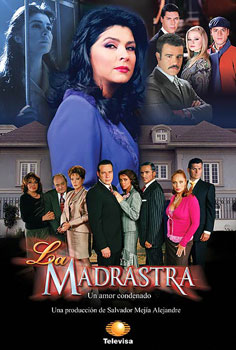
The Walt Disney Company has produced an anthology television series since 1954 under several titles and formats. The program's current title, The Wonderful World of Disney, was used from 1969 to 1979 and again from 1991 onward. The program moved among the Big Three television networks in its first four decades, but has aired on ABC since 1997 and Disney+ from 2020 to 2023.
UniMás is an American Spanish-language free-to-air television network owned by TelevisaUnivision. The network's programming, which is aimed at Hispanic Americans in the 18–34 age range, includes telenovelas and other serialized drama series, sports, sitcoms, reruns of imported series previously aired on parent network Univision, reality and variety series, and theatrically released feature films.

Silvia Pinal Hidalgo is a Mexican actress. She began her career in the theater, venturing into cinema in 1949. She is one of Mexico's greatest female stars, one of the last surviving major stars from the Golden Age of Mexican cinema and part of the Golden Age of Hollywood for her film Shark! (1969). Her work in film and popularity in her native country led Pinal to work in Europe. Pinal achieved international recognition by starring in a famous film trilogy directed by Luis Buñuel: Viridiana (1961), El ángel exterminador (1962) and Simón del Desierto (1965).

Rescue 911 is an informational docudrama television series that premiered on CBS on April 18, 1989, and ended on August 27, 1996. The series was hosted by William Shatner and featured reenactments of emergencies that often involved calls to 911.

María Inés Guerra Núñez, commonly known as María Inés Guerra, is a Mexican TV hostess and singer.
Rodrigo Nehme is a Mexican actor known for his performance in the Mexican telenovela Rebelde as Nico Huber.
Lo que callamos las mujeres, is a Mexican anthology television series which deals with the social problems of Mexican society. The show started airing on the Mexican television network Azteca 13 as a way to compete with Canal de las Estrellas' Mujer, casos de la vida real. It started airing on the network in 2000 and has run continuously since then. The series continues to be one of the most popular programs on said television station and is currently being broadcast with great acceptance. Some of the most important theater, film and television actors have paraded in its cast. One if its stars is actress Angélica Magaña.

Karyme Lozano is a Mexican actress. She has appeared on three covers of Los 50 Mas Bellos of People en Español. She has been nominated and won several awards for Best Actress including for Premios TVyNovelas and Las Palmas de Oro.
Stephanie Salas Banquells is a Mexican singer and actress. She was born into one of the most famous show business families in all of Mexico. She is the daughter of actress Silvia Pasquel and musician Micky Salas; she is the granddaughter of actress Silvia Pinal and actor Rafael Banquells; and she is the niece of singers Alejandra Guzmán and Rocío Banquells. She has two daughters, Michelle Salas and Camila Valero.

Telemundo is an American Spanish-language terrestrial television network owned by NBCUniversal Telemundo Enterprises, a division of NBCUniversal, which in turn is a wholly owned subsidiary of Comcast. It provides content nationally with programming syndicated worldwide to more than 100 countries in over 35 languages.

Television is a popular form of entertainment in Mexico, with mass entertainment playing an important role in creating a national, unified culture. The telenovelas are very traditional in Mexico and are translated to many languages and seen all over the world with renowned names like Lucero, Thalía, Verónica Castro, Itati, Leticia Calderón and Victoria Ruffo.

Univision is an American Spanish-language free-to-air television network owned by TelevisaUnivision. It is the United States' largest provider of Spanish-language content. The network's programming is aimed at the Latino public and includes telenovelas and other drama series, sports, sitcoms, reality and variety series, news programming, and imported Spanish-language feature films. Univision is headquartered in Midtown Manhattan, New York City, and has its major studios, production facilities, and business operations based in Doral, Florida.
XHDRBZ is a Mexican sketch comedy television series created by Eugenio Derbez. It premiered on Canal de las Estrellas on 15 July 2002. XHDRBZ emulated a television channel that broadcasts sketches. The series ended production in 2004, due to Derbez wanting to focus on other projects. The final episode aired on 10 March 2004.
Toonturama is an American children's programming block that airs on the Spanish-language television network UniMás which debuted on January 15, 2002 and January 19, 2002. The four-hour block—which airs Saturday and Sunday mornings from 7:00 a.m. to 11:00 a.m. Eastern Time and Pacific Time—features live action and animated series aimed at children between the ages of 2 and 14. It was the network's attempt to have a Saturday morning block.

Verónica Merchant is a Mexican actress who played the role of Mariana Romero Vargas in the Mexican telenovela Corazón salvaje.

La Rosa de Guadalupe is a Mexican anthology drama television series created by Carlos Mercado Orduña and produced by Miguel Ángel Herros. The series centers on Mexican Catholic religiosity, specifically to the Virgin of Guadalupe. It is set in modern times and mostly takes place in Mexico City, although location varies in some episodes. The series premiered on Las Estrellas on 5 February 2008. In the United States, the series debuted on Univision on 26 June 2008.
Diego Schoening, is a Mexican singer, actor and television host.
Juan Pablo Magallanes Moreno is a Mexican actor known for his appearances in different chapters of "La Rosa De Guadalupe" and "Mujer, Casos de la Vida Real"

La Madrastra is a Mexican telenovela. It was produced by Televisa and broadcast on Canal de las Estrellas in Mexico from Monday, February 7, 2005, through Friday, July 29, 2005. The program became an unexpected success, garnering ratings in excess of 30 points. Starring Victoria Ruffo and César Évora, who last appeared together in 2000's Abrázame muy fuerte, along with Eduardo Capetillo, Jacqueline Andere, Ana Martín, Cecilia Gabriela, Martha Julia, Guillermo García Cantú, René Casados and Sabine Moussier, La madrastra tells the story of María, a woman who lost twenty years of her life after being falsely accused of murder and who returns to Mexico to exact revenge on her husband and friends who abandoned her and to see her beloved children once more.
The 9th TVyNovelas Awards were an academy of special awards to the best soap operas and TV shows. The awards ceremony took place on April 8, 1991 in Centro de Espectáculos “Premier“, México D.F. The ceremony was televised in Mexico by Canal de las Estrellas.











